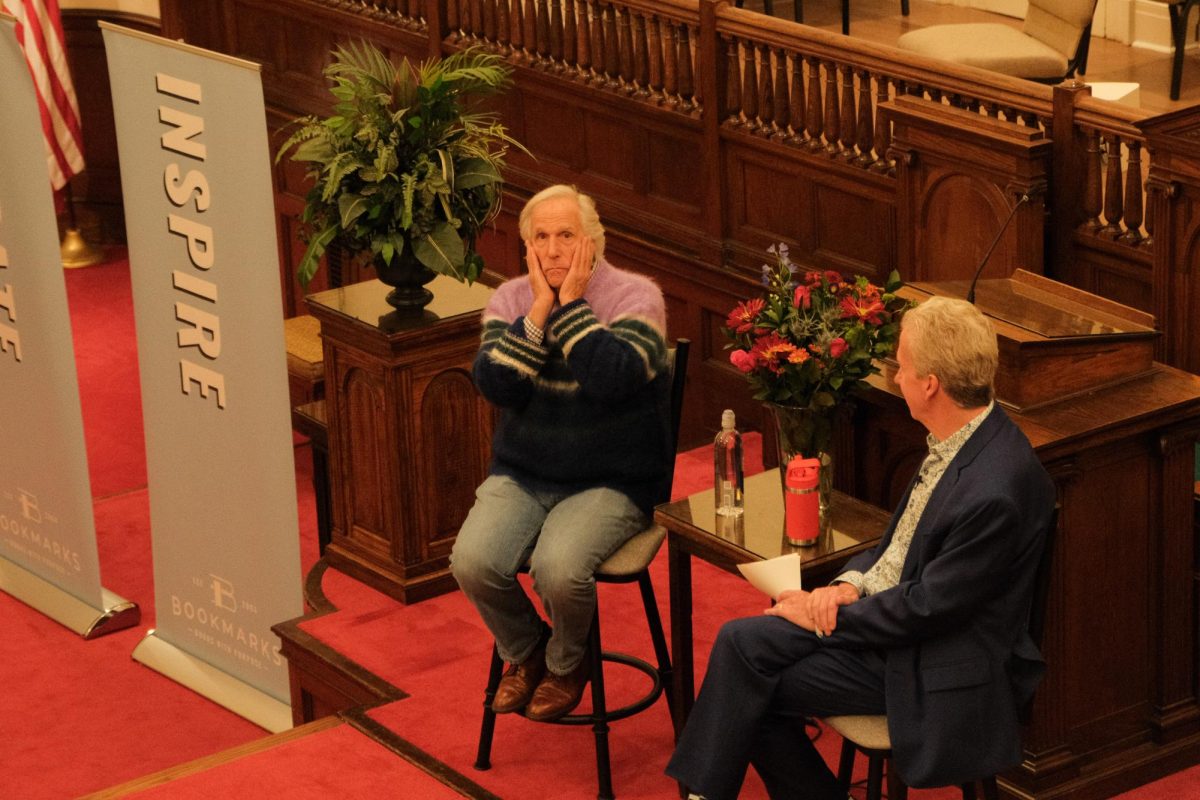Emmy award-winning actor Henry Winkler, best known for his role as the iconic, earnest greaser, Fonzie (or, “The Fonz”) in the long-running hit TV show “Happy Days” paid a visit to Winston-Salem earlier this month to promote his new book.
Winston-Salem’s very own non-profit bookstore, Bookmarks, hosted the visit as part of the book tour for Winkler’s New York Times bestseller, “Being Henry,” which featured a mere 15 stops.
The “Barry” star’s new book focuses on his tumultuous upbringing, which included navigating dyslexia as a young child. The book contextualizes Winkler’s industry reputation as the “nice guy” of Hollywood, highlighting how that identity was actually forged through hardship. When he struggled with his (at the time) undiagnosed disability, Winkler never found refuge in his parents, who often resorted to calling him names.
“I was called stupid, lazy…I was called ‘dummer hund,’ which, if you don’t speak German, means dumb dog,” Winkler said during his talk.
He expressed disappointment in his parents and urged those in the audience in similar roles not to make their mistakes.
“When you see your child have a problem, even if you don’t know the name of that problem, if you don’t know how to solve the problem, it is our job to make that child a little more comfortable. And not call them dogs,” he said. “When I found out that I was dyslexic, I was angry.”
In spite of these challenges, Winkler imagines his life would be quite different without his disability.
“I understand maybe if I didn’t have that struggle with my learning challenge, I would not be here with you tonight,” he added.
Winkler argued that disabilities like dyslexia too often define student success. A low grade in a geometry class was a thorn in his side during high school, but he still worked his way into Yale’s prestigious drama school.
“I will then also say if there are young people who are still in school, and they are struggling in this hall tonight, I will tell you, and you can take this to the bank: how you learn has nothing to do with how brilliant you are,” he said.
Before his diagnosis, he said he would often project humor as a means of covering up a missed line or stumbled que here and there. That same brand of humor would follow him through his career, even into favorite roles such as the perennial loser attorney, Barry Zuckercorn in the early-2000s FOX sitcom, “Arrested Development.”
When Winkler landed the role of The Fonz in 1973, he was still haunted by his childhood struggles. His interactions on-set were often informed by the way he was treated as a kid. The adult Winkler made attempts to make sure no one experienced the level of abandonment he felt as a child.
“I was being, for a lot of my life, who I thought I should be,” Winkler said. “And I was so boxed in by not letting anything come out of that other than my image of who I shouldn’t be too scared to change.”
The enduring legacy of Fonzie is something Winkler still holds very dear, even as other roles have garnered more critical acclaim. His character in HBO’s “Barry,” Gene Cousineau, earned him his first Emmy in 2018.
The event spanned many subjects, including the origins of the now-ubiquitous idiom “jumping the shark” (which, if you didn’t know, was a Winkler original), the local favorite restaurant Mozelles and Winkler’s other work as a children’s author.
But even as Winkler enters the twilight years of his career, he still looks ahead.
“My dream is to get back to Broadway. I did one play, it opened and closed in seven days,” Winkler said. “One play ran for nine months. I did another play that opened and closed that same night. So I am looking forward to doing that again.”
The talk concluded with a read-aloud passage of Winkler’s book, summarizing a career — and life — well spent.
“Only now do I understand that things come in their own time,” Winkler said. “You couldn’t have known then what you know now, that only the process of living gets you there. You must do work in order to eat the fruit of growing, of being. In my late ‘70s, I’m trying very hard to live in the moment and enjoy every moment. I am thrilled and elated to be here now.”










